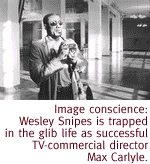

|

Love Stinks, Part II.
By Stacey Richter
MIKE FIGGIS IS making a career of creating some of the
most shamelessly romantic anti-love stories to ever grace the
silver screen. If his Leaving Las Vegas was a bad-idea
movie to see on a date, then his newest, One Night Stand,
is even worse. Love is a pernicious, toxic little pill to Figgis,
and though it's refreshing to see a flick that doesn't follow
the standard pattern of the corny Hollywood romance, it's difficult
to swallow Figgis' strange compound of lush romanticism and world-weary
pragmatism.
The problem with One Night Stand is that, like
Leaving Las Vegas, it mixes a touching, against-all-odds love
story with sickness, hate, betrayal and death. This strategy worked
in Leaving Las Vegas largely due to the fact that Nicolas
Cage got killed off at the end, leaving his prostitute girlfriend
a little wiser and mercifully liberated from a messy relationship.
The only person who gets to die in One Night Stand is Charlie
(Robert Downey Jr.), a secondary, Puck-ish character who, by the
example of his death, inspires the kids left behind to find true
love.
 Charlie is an old friend of Max Carlyle (Wesley Snipes), a married,
successful director of TV commercials who has reluctantly embraced
the glib, sushi-eating L.A. Weltanschauun. Charlie, who's
sick with AIDS, has a more arty, in-your-face, New York way of
navigating life. When Charlie is not being a mischievous sprite,
he is being Christ-like. (Figgis shows him in crucifix position
about 20 times, in case we don't get it.) Through his friendship
with Charlie, Max gets in touch with the fragility of his own
mortality. "This isn't a dress rehearsal," Charlie sputters,
quoting the famous bumper sticker.
Charlie is an old friend of Max Carlyle (Wesley Snipes), a married,
successful director of TV commercials who has reluctantly embraced
the glib, sushi-eating L.A. Weltanschauun. Charlie, who's
sick with AIDS, has a more arty, in-your-face, New York way of
navigating life. When Charlie is not being a mischievous sprite,
he is being Christ-like. (Figgis shows him in crucifix position
about 20 times, in case we don't get it.) Through his friendship
with Charlie, Max gets in touch with the fragility of his own
mortality. "This isn't a dress rehearsal," Charlie sputters,
quoting the famous bumper sticker.
When Max meets Karen (Nastassja Kinski) he takes the advice to
heart. The script was co-written by Joe Eszterhas (of Showgirls
fame), and at certain junctures you can really sense Eszterhas'
bombastic hand. Like, Max and Karen get mugged by a pair of bad-ass
yuppies, one of whom hefts Kinski's breast and comments: "Nice
tit." It's okay though, Max saves her. Then she starts crying.
Despite the fact that Karen is an accomplished "rocket scientist,"
she cries through most of the movie--and we know what happens
to women in the movies when they start crying. Somebody kisses
them.
 Max and Karen spend the eponymous one night together, then go
their separate ways. But Max has apparently tasted some kind of
potent, forbidden fruit, and for him, nothing will ever be the
same. He realizes that his marriage sucks. He becomes an asshole.
He makes an Armani commercial.
Max and Karen spend the eponymous one night together, then go
their separate ways. But Max has apparently tasted some kind of
potent, forbidden fruit, and for him, nothing will ever be the
same. He realizes that his marriage sucks. He becomes an asshole.
He makes an Armani commercial.
Mike Figgis is an excellent director. He has a wonderful, playful
visual sense that outstrips most other directors who incorporate
"experimental" elements into mainstream movies (with
the exception of Spike Lee, who is clearly an influence on Figgis).
Throughout One Night Stand, he plays with speed and time--accelerating
footage, or slowing it down, or jump-cutting--to create a woozy,
impressionist effect that underscores the emotional condition
of his characters.
He's also very good with actors. Snipes comes off as likable,
even when he's being a jerk, and Kinski has a quiet dignity despite
the fact that she's crying the whole time. But it's Robert Downey
Jr. who gives the best performance, in one of the longest death
scenes in movie history. What's interesting about Downey's performance
is that counter to expectations, he doesn't make dying look particularly
sad, or pathetic, or anguished. He makes it seem repulsive, actually--messy
and stressful and very biological. At times it's even hard to
understand what he's saying, because he's having breathing problems,
and it takes some guts on Figgis' part to include this stuff.
 It also takes some guts on Figgis' part to portray an interracial
tryst without making an issue of it. But despite these strengths,
One Night Stand is, in the final analysis, an ungenerous,
mean-spirited movie.
It also takes some guts on Figgis' part to portray an interracial
tryst without making an issue of it. But despite these strengths,
One Night Stand is, in the final analysis, an ungenerous,
mean-spirited movie.
Max and Karen are both married, and the manner in which Figgis
portrays their spouses (Ming-Na Wen and Kyle MacLachlan) ruins
any sensitivity the movie might have claimed. Both are shown as
borderline villains; they're empty and superficial and mean. Karen's
husband is homophobic. The sex scene between Max and his wife
Mimi rates way, way up there on the misogyny scale. Compared
to the meek, angelic Karen, Max's selfish wife Mimi actually enjoys
sex (instead of weeping through it). "Fuck the kids,"
she says, when Max tries to quiet her down, "I'm coming!"
It's difficult to take the love story between Max and Karen seriously
in light of the difficulties they're having with their respective
spouses. This movie makes the whole process of coupling up seem
doomed. If Max and Karen made such lousy choices with their spouses,
why would they do any better with their lovers?
One Night Stand is playing at Century Gateway (792-9000)
and Century Park (620-0750) cinemas.

|
 |





